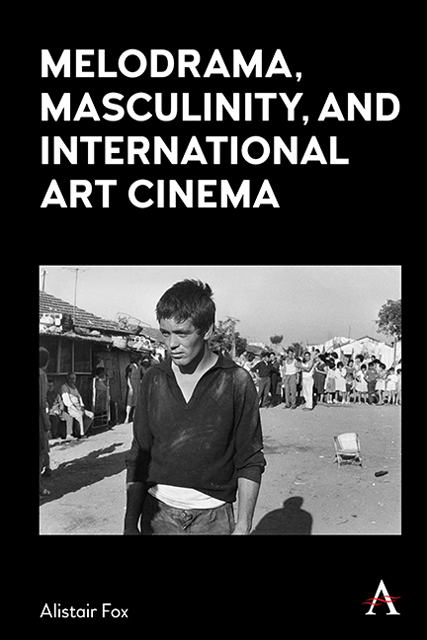Book contents
- Frontmatter
- Dedication
- Contents
- List of Figures
- Preface
- Acknowledgments
- Introduction
- Chapter 1 Italian Neorealism and the Emergence of the Male Melodrama: Vittorio De Sica’s Bicycle Thieves (1948) and Umberto D. (1952)
- Chapter 2 The Migration of Male Melodrama into Non-Western Cultures: Satyajit Ray’s The Apu Trilogy (1955–59) and “Fourth Cinema”
- Chapter 3 Hollywood Melodrama as a Vehicle for Self-Projection: Vincente Minnelli’s Tea and Sympathy (1956) and Home from the Hill (1960)
- Chapter 4 The Political Turns Personal: Neo-Neorealism and Pier Paolo Pasolini’s Accattone (1961)
- Chapter 5 Personal Cinema as Psychodrama: Ingmar Bergman’s Wild Strawberries (1957), Winter Light (1963) and Hour of the Wolf (1968)
- Chapter 6 François Truffaut and the Tyranny of Romantic Obsession: The Soft Skin (1964), Mississippi Mermaid (1969) and The Woman Next Door (1981)
- Chapter 7 Figuring an Authorial Fantasmatic: Jacques Demy’s The Umbrellas of Cherbourg (1964), A Room In Town (1982) and Parking (1985)
- Chapter 8 Rainer Werner Fassbinder and the Emergence of Queer Cinema: The Merchant of Four Seasons (1972), Fox and His Friends (1975) and In a Year with 13 Moons (1978)
- Chapter 9 Visual Aestheticism and the Queer Prestige Melodrama: Call Me by Your Name (2017) and Luca Guadagnino’s Desire Trilogy
- Conclusion
- List of Films Cited
- Select Bibliography
- Index
Chapter 4 - The Political Turns Personal: Neo-Neorealism and Pier Paolo Pasolini’s Accattone (1961)
Published online by Cambridge University Press: 10 January 2023
- Frontmatter
- Dedication
- Contents
- List of Figures
- Preface
- Acknowledgments
- Introduction
- Chapter 1 Italian Neorealism and the Emergence of the Male Melodrama: Vittorio De Sica’s Bicycle Thieves (1948) and Umberto D. (1952)
- Chapter 2 The Migration of Male Melodrama into Non-Western Cultures: Satyajit Ray’s The Apu Trilogy (1955–59) and “Fourth Cinema”
- Chapter 3 Hollywood Melodrama as a Vehicle for Self-Projection: Vincente Minnelli’s Tea and Sympathy (1956) and Home from the Hill (1960)
- Chapter 4 The Political Turns Personal: Neo-Neorealism and Pier Paolo Pasolini’s Accattone (1961)
- Chapter 5 Personal Cinema as Psychodrama: Ingmar Bergman’s Wild Strawberries (1957), Winter Light (1963) and Hour of the Wolf (1968)
- Chapter 6 François Truffaut and the Tyranny of Romantic Obsession: The Soft Skin (1964), Mississippi Mermaid (1969) and The Woman Next Door (1981)
- Chapter 7 Figuring an Authorial Fantasmatic: Jacques Demy’s The Umbrellas of Cherbourg (1964), A Room In Town (1982) and Parking (1985)
- Chapter 8 Rainer Werner Fassbinder and the Emergence of Queer Cinema: The Merchant of Four Seasons (1972), Fox and His Friends (1975) and In a Year with 13 Moons (1978)
- Chapter 9 Visual Aestheticism and the Queer Prestige Melodrama: Call Me by Your Name (2017) and Luca Guadagnino’s Desire Trilogy
- Conclusion
- List of Films Cited
- Select Bibliography
- Index
Summary
In Italy, during the decade that followed Vittorio De Sica’s introduction of a new type of male-centered film, neorealism morphed into a form of neo-neorealism that shifted the focus from social concerns to the inner life of individuals. Picking up from De Sica’s demonstration of how the neorealist mode of filmmaking could be utilized to reveal men’s “secret dramas,” Pier Paolo Pasolini and other filmmakers from the next generation, like Vittorio De Seta, proceeded to show how this mode could be exploited for purposes of self-experience and self-projection, reflecting a deepening awareness of personal subjectivity.
Pasolini’s first feature film, Accattone (1961), provides a stunning example of how readily an ostensible concern with sociopolitical issues could be coopted to serve as a vehicle for the presentation of a “subterranean film” that was personal rather than political, without in any way diminishing the impact of the explicit political concern. The means by which he achieved this lay in a skillful manipulation of strategies that Pasolini saw as constituting the “cinema of poetry”—strategies that can be identified in virtually all the subsequent male melodramas that critics have judged to have affective power and aesthetic merit.
Critics have usually looked at Accattone through a political lens, focusing on how the film exposes the plight of the underprivileged Roman subproletariat from a left-wing perspective. Viewed in this way, the eponymous Accattone (literally low life or beggar) is seen as a victim of bourgeois callousness and indifference, his status as a martyr being underlined by the use of the emotive iconography of Christianity. Pasolini himself encouraged this interpretation by emphasizing in his comments on the film the heroic status of the characters. Referring to Accattone, he said:
My vision of the world is always fundamentally a blend of the epic and the religious; therefore, with respect to these characters who suffer in misery, characters who exist outside of historical awareness, and, indeed, bourgeois awareness, these epic-religious elements play a very important role. Misery is always, on account of its personal and epic characteristics, and the elements that operate in the psychology of an underprivileged, poor, subproletarian person, are always to some extent pure, owing to the fact they lack awareness, and hence are essential.
- Type
- Chapter
- Information
- Melodrama, Masculinity and International Art Cinema , pp. 75 - 92Publisher: Anthem PressPrint publication year: 2022



